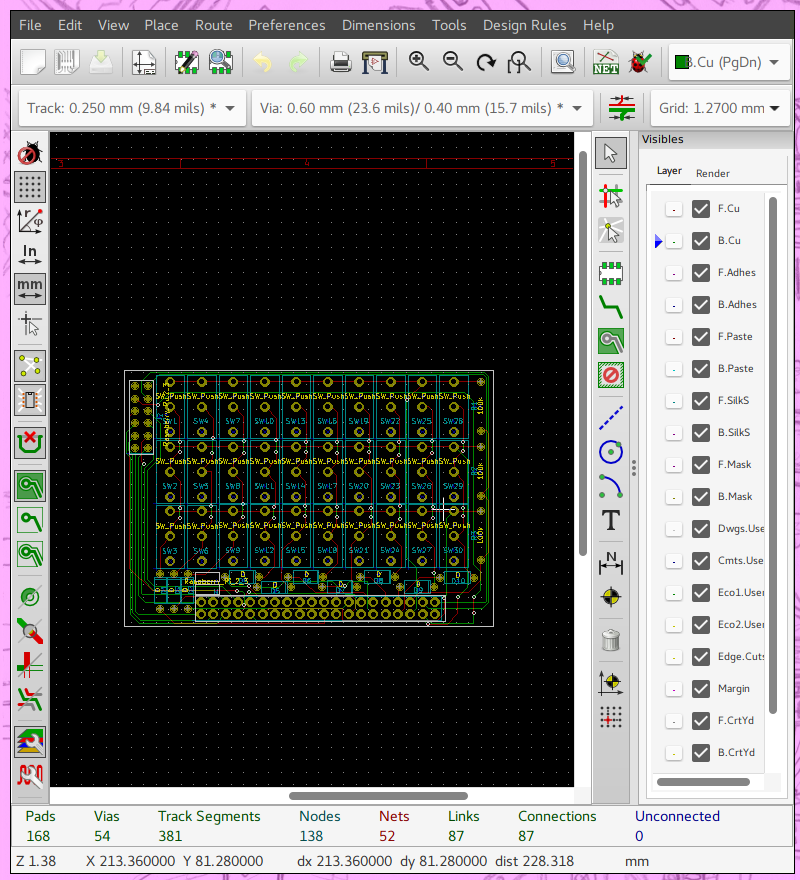When it comes to computers, it's almost required that you teach yourself everything there is to know. This autodidacticism might work for some, but becomes frustrating for preteens not used to it. On the other hand, in person educational programs offered by schools are often aimed towards the lowest common denominator, oversimplifying things to the point where your child loses interest in them.
The Urban Computing and Electronics Summer Program aims to provide a balance between this, offering practical and challenging course material, but also providing in person tutoring for those who have little prior experience. This two week program is tailored to your child's skill level and offers topics ranging from High Level Programming, Low Level Programming, Electronics, Web Design, Cyber Security, and UNIX system maintenance.




My name is Haoran S. Diao, I'm a self taught electronics and programming hobbyist. I have experience in:
- Electronics Software Drivers(kernel modules,microcontroller code)
- Electronics Hardware Design(Custom PCB design etc...)
- Programming(C, C++, Golang, Java, HTML/Javascript/CSS, Python, Lua, Bash scripts)
- Linux System Maintenance(I have written my own kernel module) Web Design(I have built http://themandelbots.com and http://hairydiode.xyz and this site from scratch)
- Image Processing and Graphics(OpenCV and OpenGL)
- Basic Computer Security(best practices, CTF challenges)
- Robotics (Head programmer at the Urbana Mandelbots FTC team)
I have been:
- Head Programmer at the Urbana Mandelbots Robotics Team
- Former Vice Present at a student run non-profit(Resigned)
A dedicated laptop that Linux will be installed on, this can be any obsolete laptop made after 2010. This does not have to be a very fast computer at all. In most cases, previous data and OS will be wiped on installation of new OS, but dualbooting(keeping both systems) can be done for certain computers. If you can no provide a dedicated laptop then you can purchase a Raspberry Pi kit for ~80 from me or online.
Optional Course Materials:
- -2 USB drives 8GB minimum, this is to help with file transfer and OS installation.
- -USB wifi dongle, same as above.
These will only be required for certain projects, you are not required to bring these if we do not end up exploring that topic.
- 3.b - An Arduino kit or PIC microcontroller w/ programmer.
- 4.b Ti-8* series calculator
- 7.c - USB wifi dongle
- 1)Linux System Maintenance:
- a - Using the Terminal
- b - Drive Partitioning and Installing a System from Scratch
- c - Shell Scripting
- d - Compiling Custom Kernels
- 2)High Level Programming(farther away from hardware):
- a - Image Recognition Algorithms in Python with the OpenCV library.
- c - Making Games with Pygame in Python.
- d - Making Minecraft Mods with Java.
- 3)Low Level Programming(closer to hardware):
- a - Linux Kernel Modules using C
- b - Microcontroller Code using C
- c - Making Games with C++ using the OpenGL and SDL Libraries.
- 4)Just For Fun Programming:
- a - Coding in Minecraft with Lua
- b - Coding on a Ti-8* Calculator with TiBasic
- 5)Electronnics Design and CAD:
- a - Designing Circuits and PCBs in Kicad or EagleCad
- b - Mechanical Drawing with LibreCAD
- 6)Hands On Electronics
- a - Building Circuits with 74xx Series Logic ICs(Integrated Ciruits)
- b - Building Custom Keyboards
- 7)Basic Cybersecurity and Penetration Testing
- a - Personal Security Best Practices (Operational Security, Network Secruity)
- a - PGP, SSL and Other Uses for Encruption.
- b - Applying Security Patches to Your System.
- c - Wireless Network Pentesting
- 8) Static Web Design
- a - HTML/CSS
- b - Javascript
- c - Hosting your own website with github.io
Bitwise Operators: &, bitwise and; |, bitwise or; ~, bitwise not; ^, bitwise xor. Bitwise operators apply logic operations in each position of a binary number, return the resulting binary number.
Boolean Operators: &&, boolean and; ||, boolean or; !, boolean not. Boolean operators apply logic on whether then entire number is true or false, and returns true or false.
Comparisons: >, greater than; <, lesser than; >=, greater than or equals; <=, lesser than or equals; ==, equals; !=, does not equal.
AND: if both are true, then the output is true. OR: if one is true, then the output is true. XOR: if one is true and the other false, then the output is true, otherwise it is false. NOT: if true, false; if false, true.
